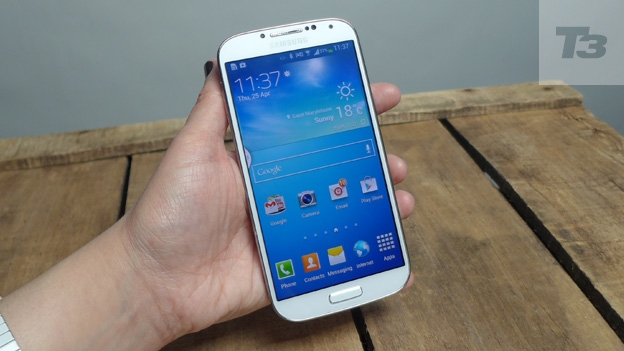Samsung Galaxy S4 review
Should you buy the ex-flagship over the all-new Galaxy range?


-
+
Range of innovations
-
+
Super fast processor
-
+
Great battery life
-
-
Too many gimmicks
-
-
Too big for some
-
-
Design lacks class
Why you can trust T3





















Samsung Galaxy S4 review: Samsung's flagship smartphone wants to topple the iPhone from its top spot, and wipe the floor with other manufacturers. Can it succeed?
Update: The Samsung Galaxy S5 made its debut at the MWC show in Barcelona on 24 February 2014. But is it worth upgrading from the S4? Find out in our Samsung Galaxy S5 review.
There have been a number of other challengers to the Galaxy S4 since it launched, but now it has the more palatable price of a shade over £300, is it still worth buying?
This was Samsung's biggest release for a year. All new features, a faster core, better screen... and now it's at a lower cost, should you consider upgrading?
The brand did not radically change the design of the phone compared to the predecessor, the Samsung Galaxy S3. Why would it? – the S3 was massively popular, so the company knew it had a winning design.
Even so, look closely and you'll see definite style improvements, with straighter lines and a sleeker, more serious look to it. The S3 had swirly, curvy lines demarcating the chrome effect from the colour. On the Samsung S4 it's all straight edges, giving a more elegant and slightly more clinical look that is at once more demure and grown-up.
And to be honest, it looks a bit more like the conventional design of other smartphones so whether this new design is better or worse is purely a matter of taste. The curves at the top and bottom edges are less tapered this time, so the corners are a touch squarer, which is also more pleasing. Less of a lozenge, more of a rectangle with soft edges.
But it's the same gloss plastic finish, so if you're keener on a more premium feel like the HTC One, you may feel this is a bit shouty. Even so, it's a classier look than the S3, even on the back where the camera lens (bigger this time) has just the flash near it. On the S3 the flash was to the left of the lens, the speaker to the right. Here, the flash is directly below the lens, both centred at the top of the handset. And the speaker grille is towards the bottom and off-centre, which looks neater.
The design of the buttons has barely changed. The S3 wasn't big on buttons, sporting only a volume rocker on the left edge and the power button on the right. These are in the same places, but this time around the power button is a little bigger. So is the volume rocker which is a little higher up on the left edge, but these are small changes but, we'd say, are all improvements.
Samsung Galaxy S4: Size and build
Like last year's model, this isn't a phone for petite hands. But Samsung has squeezed in a screen that's bigger than the S3's into a handset that's slightly smaller (the dimensions are 136.6mm tall, the same as the S3, while the width and depth, 69.8mm and 7.9mm, are smaller).
The change in depth is particularly noticeable and means that though it's big it doesn't feel unmanageable. The display is 5in this year, against 2012's 4.8in on the S3.
Check out our Samsung Galaxy S4 vs Samsung Galaxy S3 specs showdown
Even so, this phone clocks in at 130g against the marginally heavier 133g last time around. Most premium smartphones these days have sealed-in batteries – without the need to finish the battery in a removable case it's possible to maximise the size and power of the cell – but Samsung has opted for a back that pops off.
This has a big advantage because it means if you run out of juice you can pop in a replacement battery. But it can mean that the build is less persuasive or creaks annoyingly when you flex the phone in your hands. In fact, there's precious little creak – this is a well-engineered machine.
As before there are two colours, this time white and black. Both look good, though the white looks more lively and has a gentle, subtle texturing that you only see when you look closely.
As with any smartphone, you need buttons to supplement that touchscreen. Samsung, like Apple but unlike almost everyone else, has a physical home button on the front, making it easier to wake the screen. This is especially important when the screen is as big as this phone. Reaching to the bottom of the display rather than the top right can make a palpable difference.
Even so, you can go there if you prefer as the power button is towards the top of the right edge, as usual with Samsung phones. The Home button is a more symmetrical shape than on last year's model, though still standing slightly proud.
The headphone socket is in the conventional place on the top edge. Apple's iPhone 6 has it on the bottom. Why should this matter? Well, if you have a protective slipcase, say, you have to remember when listening to music to slide the iPhone into it the wrong way up, which is counter-intuitive.
Better to make a statement with it, as the Moto X does by plonking it on top in the centre. This left-of-centre placement on the top of the S4 is unexceptional, but fine.
Samsung Galaxy S4: Features
Okay, deep breath, we've got a lot to get through. This phone is choc-a-block with features. Last year's Smart Stay technology, where the front-facing camera would monitor your eyeballs and dim the screen when you weren't looking at it, has been enhanced.
Samsung Galaxy S4: Smart Pause
So now, if you're watching video and your peepers stray, Smart Pause stops playback until you look back again, at which point it smoothly restarts. At first, this seems like a gimmick too far – pressing pause while you watch isn't difficult but in practice this...well, it works, which is the best we can say about it. It's activated by watching your eyes and your head, so it can see when you've turned your face away.
That conversation which is annoyingly distracting you from watching the movie you've downloaded is less invasive because you're not missing a second of the film – it's waiting for you (except it can take a second or two to stop the movie at times).
Samsung Galaxy S4: Smart Scroll
The same tech is used in conjunction with the accelerometer so that when you reach the bottom of a web page, tilting the phone scrolls the content up for you. You can also, and this is cool, tip your head to achieve the same result – handy if the phone is on the table. It works the other way if you need to scroll up the screen to read the top of the page again.
And there are other features which mean you don't have to touch the touchscreen. Pass your hand near the phone when it's in standby and the screen gently wakes, shows a near-dark background speckled with stars and reveals how many texts, emails or missed calls you have before turning off again. It's a neat feature.
There are gestures which mean that when you hover your fingers near a contact in your address book it reveals more details without your having to open the contact. You can turn pages by waving your hand nearby.
At some point you have to ask why you'd want to do this, as after all it's not difficult to touch the screen, you don't have to press hard or anything. It could be useful if your hands are wet, or covered in sand or sun tan lotion, so beachside use of the S4 is one possibility.
Or maybe you're following a recipe onscreen – now you can scroll the screen without your flour-and-oil covered hands smearing the display. Or it's a gimmick. Take your pick.
There's one more way not to touch the screen: the sensitivity can go up to 11 so you can use the phone with your gloves on. And after the spring the UK has had, you'll know that's important. Nokia has it on many of its Lumia handsets but it's good to see the technology implemented here.
Samsung Galaxy S4: S Translate
S Translate is a built-in app that you may never need or which could save your life. It translates from English to Spanish, Brazilian Portuguese and more. With some languages you're restricted to text on screen but on others you simply say what's on your mind and the rest is magic.
It turns your spoken words into text and quickly translates them to the second language. Touch a speech icon and it'll say the words for you and is ready for your foreign interlocutor to speak back. The voices sound basic but you can upgrade them by means of a free download to superior voice files.
To work it needs a decent data connection, which annoyingly means you can only use it free abroad (the very place you'd want it) if you're in a wi-fi area. Of course, you'd splash out on that roaming connection in case of a crisis but it's worth remembering that using it may not be free. Efficient and highly usable, even so.
Samsung Galaxy S4: S Health
The phone has wellness features built in. By wellness, Samsung means the S4 wants to encourage you to be healthy. So the pedometer can spur you on to take 10,000 steps, rewarding you with a notification when you get there. It knows whether you're walking, running or climbing stairs.
There are even temperature and humidity sensors, so you can monitor more than you'd imagine. Truth is that this capability is moderately useful but if you're serious about monitoring your fitness, you're better off with the Nike+ FuelBand or Jawbone UP which have extra data and more features.
The health space on mobiles has seen a tremendous growth in recent years - it's one of the key battlegrounds for the likes of Sony, Apple and LG - but this was one of the first forays in. If you look at current phones, the Note 4 can even monitor the oxygen saturation levels in your blood, and while the S4 would struggle to do the same without the dedicated heart rate monitor, the software upgrades as a result of this continued improvement are coming to the device.
You can also use the phone as a decent TV remote, thanks to the infra-red transmitter in the top. The extra features all work well, although most of them may prove too gimmicky for most users.
Samsung Galaxy S4: NFC
Near Field Communication is the latest connectivity set-up. It's been around for a few years but is yet to reach great usefulness. Still, Samsung has done more than some manufacturers to make it useful. You can tap your phone against another to transfer items such as images from one Galaxy S4 to another.
It's also enabling payment services - thanks to Apple Pay appearing, suddenly everyone seems to know that you can pay for stuff with your phone. It's a little tricky to set up on the S4, but check with your network to see if you can do it... EE especially loves to get this out there.
Samsung Galaxy S4: Android
This phone used the latest version of Android operating software: Jelly Bean, version 4.2.2, and now has upgraded to Android 4.4, with Android 5 (Lollipop) confirmed too.
It's elegant and good-looking, and the latest features include some very useful extras like multiple user accounts so different family members have different-looking versions on the same phone with separate home screens and all.
There's also Google Now, a now-improved information system which aims to provide the answers even before you've asked the question. Quick information, in other words. It's easily accessible from a long press on the home button.
Samsung Galaxy S4: Screen
This is not the first Full HD resolution screen. Those 1920 x 1080 pixels are also found on most other phones these days, and some have even gone higher to QHD. But this is more than enough. It's 455 pixels per inch (the newer iPhone 5S manages just 326ppi) so no wonder it looks great.
Check out our Samsung Galaxy S4 vs iPhone 5 specs showdown
And this is a Super AMOLED display, which Samsung is familiar with and knows how to optimise. It's amazingly vivid, punchily colourful, and laser-sharp. Altogether it's a screen that's hard to resist thanks to its glossy richness.
AMOLED's benefits include a super-bright colour range, though in the wrong hands this can become over-saturated and eyeball-searing. But Samsung has toned things down a little so it's rich without being unwatchable on the S4.
Video playback can be a drain on the battery, but it's hard to resist when HD is played in pixel-perfect rendering on this gorgeous display. Video runs stutter-free and super-smooth, whether it's stuff you've recorded or a downloaded file. This is a great screen.
Samsung Galaxy S4: Camera
Samsung has one of those new-fangled 13MP sensors that's also found on the Sony Xperia Z. it's a powerful little devil, that delivers strong shots and is easy to use. Low light, as ever with smartphone cameras, is not your friend.
But this is a versatile and capable camera. For all that, the photos aren't quite as wonderful as on the HTC One which takes a different approach thanks to its fewer-but-better pixel strategy. The four-megapixel sensor on HTC's phone is spectacular in lower light, managing it so well you may never need to turn the flash on.
There are plenty of features to explore here, too, such as the facility to shoot on the front and rear cameras simultaneously. You may struggle to find compelling uses for this, but it adds extra ways to save your memories.
If you're on your own at a spectacular vista, perhaps, you can include your smiling face in the corner of the view. Or at a gig you can see what's on stage and what the crazy dancing guy behind you is doing. It takes some work to make the most of it and to frame both shots simultaneously, and this is the kind of feature that you may only use rarely.
More useful is HDR, where the camera takes several shots quickly and combines them to offer greater contrast and less shadowy areas. It's not unique to Samsung, of course, but works well. There's an eraser mode which also takes multiple shots and lets you delete an element – like a photobombing relative, say. But you do need to set this mode up before you shoot, please note.
Other effects include Drama Shot which overlays one pic on top of another so you have multiple images of your subject in one shot. Not all of these effects are unique to Samsung – Nokia has this one, for instance, and the animated photo options that are also included here.
Overall, this is a good camera with lots of gimmicks and decent image quality that won't let you down unless the light is low.
Samsung Galaxy S4: Performance
This is a very speedy phone. However much you're doing, it never slows down or shows any sign of being out of breath. It powers on, at speed. The touchscreen is responsive, web pages load quickly and apps launch instantly. The Qualcomm quad-core 1.9GHz chip and the 2GB of RAM combine to make this phone fast, powerful and stamina-rich.
The Galaxy S4 is a 4G handset and the available frequencies mean that it works on all the major networks. The performance is impressive too, although not capable of hitting the massive speeds of newer handsets.
There's no doubt that this phone works well on 3G but if you're getting a handset this fast and powerful, the benefit of faster data traffic is considerable.
Call quality on the S4 is excellent on this phone. There's a second microphone designed to aid with noise-cancelling and this worked very well at deducting the background noise to clarify the sound of the caller's voice. Signal strength was also good throughout, and Samsung's attractive contacts and call screen remains the same as on the Galaxy S3.
Samsung Galaxy S4: Battery
Smartphones drain batteries. Big screens drain batteries. Fancy features like air gestures drain batteries. So you might fear that the S4 would be on its knees by lunchtime. But no, there's a big cell in this phone and it keeps you going through a full day with ease.
You can make it to a second day if you're parsimonious in your usage, but daily recharges off the best peace of mind. This battery life is excellent, bettering many of its rivals at the price point, although isn't as competent as it was at launch, with something like the Windows Phone range from Nokia / Microsoft offering better value.
Samsung Galaxy S4: Verdict
Samsung's flagship is a real beauty. It feels good, looks smart and does more than previous smartphones have. On the other hand, just as most people only scratch the surface of the capabilities of their home computers, settling for email, word processing and a little light gaming, there are going to be a lot of customers who barely dig into the features here.
Many are gimmicky, some are decidedly niche, but it all still adds up to a phone with so many capabilities, it's likely there'll be lots to delight you. There are innovations to show off down the pub and genuinely useful features. Even if you don't use them, this phone's performance is so slick it is an appealing combination.
It's getting on a bit, and as such we'd warn against a long term purchase. Better to buy SIM free and get a cheaper contract, upgrading in year, rather than being stuck with nearly 4-year-old tech at the end of your term, as the Google upgrades won't be as frequent.
But the S4 is still a very competent performer for the price - with that brilliant screen, it's well worth a look even for an older model.
Samsung Galaxy S4 release date: Out now
Samsung Galaxy S4 price: £310
Read our round-up of the best Android phones.
Sign up to the T3 newsletter for smarter living straight to your inbox
Get all the latest news, reviews, deals and buying guides on gorgeous tech, home and active products from the T3 experts
-
 Gomatic's new luggage collection has some of the most stylish suitcases I've ever seen
Gomatic's new luggage collection has some of the most stylish suitcases I've ever seenSay hello to the Method Luggage line
By Lizzie Wilmot Published
-
 This Meross smart sprinkler makes it easier to water your garden – and it’s surprisingly affordable
This Meross smart sprinkler makes it easier to water your garden – and it’s surprisingly affordableThe Meross Smart Sprinkler Timer waters your garden for you
By Bethan Girdler-Maslen Published
-
 Netflix might have the next The Last Of Us in huge new sci-fi trailer
Netflix might have the next The Last Of Us in huge new sci-fi trailerThe Eternaut looks awesome
By Max Freeman-Mills Published